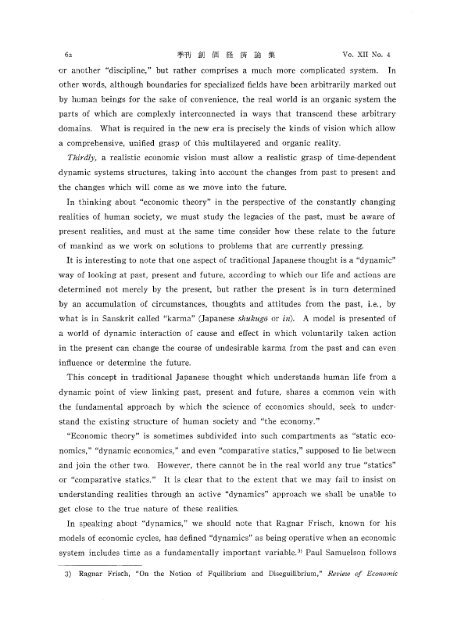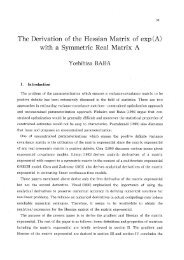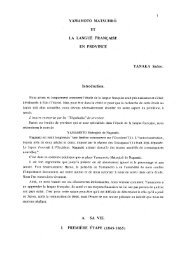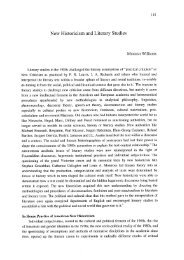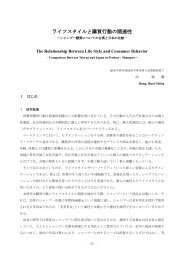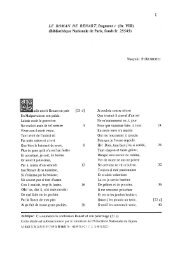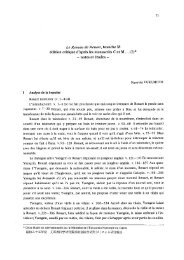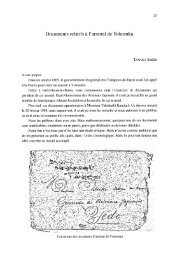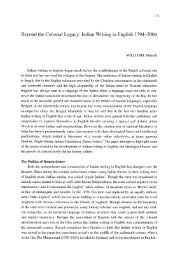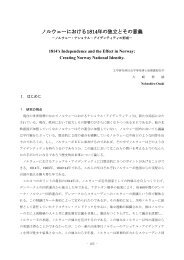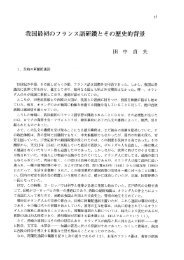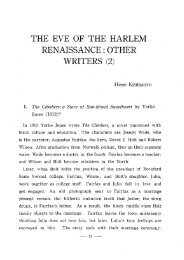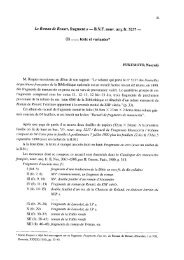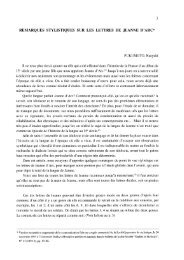vision and methodology in the new economics of global ...
vision and methodology in the new economics of global ...
vision and methodology in the new economics of global ...
Create successful ePaper yourself
Turn your PDF publications into a flip-book with our unique Google optimized e-Paper software.
62iJfJaff{ py Vo. XII No. 4<br />
,or ano<strong>the</strong>r "discipl<strong>in</strong>e ," but ra<strong>the</strong>r comprises a much more complicated system. In<br />
o<strong>the</strong>r words, although boundaries for specialized fields have been arbitrarily marked out<br />
by human be<strong>in</strong>gs for <strong>the</strong> sake <strong>of</strong> convenience, <strong>the</strong> real world is an organic system <strong>the</strong><br />
parts <strong>of</strong> which are complexly <strong>in</strong>terconnected <strong>in</strong> ways that transcend <strong>the</strong>se arbitrary<br />
doma<strong>in</strong>s. What is required <strong>in</strong> <strong>the</strong> <strong>new</strong> era is precisely <strong>the</strong> k<strong>in</strong>ds <strong>of</strong> <strong>vision</strong> which allow<br />
a comprehensive, unified grasp <strong>of</strong> this multilayered <strong>and</strong> organic reality.<br />
Thirdly, a realistic economic <strong>vision</strong> must allow a realistic grasp <strong>of</strong> time-dependent<br />
dynamic systems structures, tak<strong>in</strong>g <strong>in</strong>to account <strong>the</strong> changes from past to present <strong>and</strong><br />
<strong>the</strong> changes which will come as we move <strong>in</strong>to <strong>the</strong> future.<br />
In th<strong>in</strong>k<strong>in</strong>g about "economic <strong>the</strong>ory" <strong>in</strong> <strong>the</strong> perspective <strong>of</strong> <strong>the</strong> constantly chang<strong>in</strong>g<br />
realities <strong>of</strong> human society, we must study <strong>the</strong> legacies <strong>of</strong> <strong>the</strong> past, must be aware <strong>of</strong><br />
present realities, <strong>and</strong> must at <strong>the</strong> same time consider how <strong>the</strong>se relate to <strong>the</strong> future<br />
,<strong>of</strong> mank<strong>in</strong>d as we work on solutions to problems that are currently press<strong>in</strong>g .<br />
It is <strong>in</strong>terest<strong>in</strong>g to note that one aspect <strong>of</strong> traditional Japanese thought is a "dynamic"<br />
way <strong>of</strong> look<strong>in</strong>g at past, present <strong>and</strong> future, accord<strong>in</strong>g to which our life <strong>and</strong> actions are<br />
determ<strong>in</strong>ed not merely by <strong>the</strong> present, but ra<strong>the</strong>r <strong>the</strong> present is <strong>in</strong> turn determ<strong>in</strong>ed<br />
by an accumulation <strong>of</strong> circumstances, thoughts <strong>and</strong> attitudes from <strong>the</strong> past, i.e., by<br />
what is <strong>in</strong> Sanskrit called "karma" (Japanese shukugo or <strong>in</strong>). A model is presented <strong>of</strong><br />
a world <strong>of</strong> dynamic <strong>in</strong>teraction <strong>of</strong> cause <strong>and</strong> effect <strong>in</strong> which voluntarily taken action<br />
<strong>in</strong> <strong>the</strong> present can change <strong>the</strong> course <strong>of</strong> undesirable karma from <strong>the</strong> past <strong>and</strong> can even<br />
<strong>in</strong>fluence or determ<strong>in</strong>e <strong>the</strong> future.<br />
This concept <strong>in</strong> traditional Japanese thought which underst<strong>and</strong>s human life from a<br />
dynamic po<strong>in</strong>t <strong>of</strong> view l<strong>in</strong>k<strong>in</strong>g past, present <strong>and</strong> future, shares a common ve<strong>in</strong> with<br />
<strong>the</strong> fundamental approach by which <strong>the</strong> science <strong>of</strong> <strong>economics</strong> should, seek to under-<br />
st<strong>and</strong> <strong>the</strong> exist<strong>in</strong>g structure <strong>of</strong> human society <strong>and</strong> "<strong>the</strong> economy."<br />
"Economic <strong>the</strong>ory" is sometimes subdivided <strong>in</strong>to such compartments as "static eco -<br />
nomics," "dynamic <strong>economics</strong>," <strong>and</strong> even "comparative statics," supposed to lie between<br />
<strong>and</strong> jo<strong>in</strong> <strong>the</strong> o<strong>the</strong>r two. However, <strong>the</strong>re cannot be <strong>in</strong> <strong>the</strong> real world any true "statics"<br />
,or "comparative statics ." It is clear that to <strong>the</strong> extent that we may fail to <strong>in</strong>sist on<br />
underst<strong>and</strong><strong>in</strong>g realities through an active "dynamics" approach we shall be unable to<br />
get close to <strong>the</strong> true nature <strong>of</strong> <strong>the</strong>se realities.<br />
In speak<strong>in</strong>g about "dynamics," we should note that Ragnar Frisch, known for his<br />
models <strong>of</strong> economic cycles, has def<strong>in</strong>ed "dynamics" as be<strong>in</strong>g operative when an economic<br />
system <strong>in</strong>cludes time as a fundamentally important variable.3) Paul Samuelson follows<br />
3) Ragnar Frisch, "On <strong>the</strong> Notion <strong>of</strong> Fquilibrium <strong>and</strong> Diseguilibrium," Review <strong>of</strong> Economic


